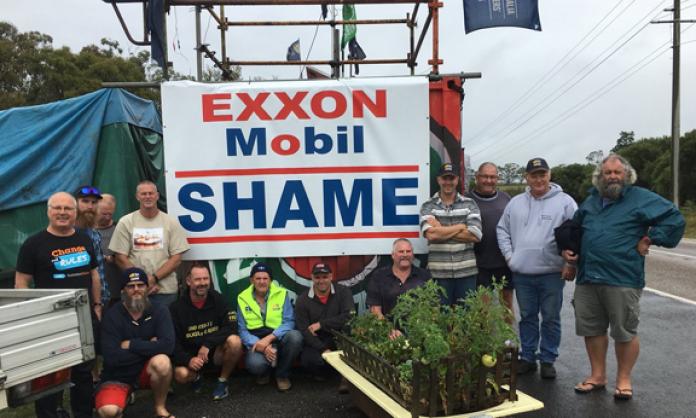217 days. That’s how long striking workers have been picketing gas giant ExxonMobil at its Esso site in Longford, Victoria. The dispute began in June 2017, when Esso’s maintenance contractor UGL forced through a sham enterprise agreement that cut wages by 30 percent and introduced drastic changes to shift rostering and workplace conditions.
The agreement that Esso and UGL want to apply to hundreds of workers in Victoria was voted on by five workers in Western Australia. The deal was then presented to the Longford workers as a “take it or leave it” proposition in a legal manoeuvre similar to that which sparked the long-running CUB protest in 2016. In response, 200 contracted maintenance workers walked off the Longford rig and processing plant to set up a protest at the gate.
That’s where we find ourselves today, more than six months into the strike, at a community rally called by the three unions involved, the Electrical Trades Union, Australian Manufacturing Workers’ Union and the Australian Workers’ Union.
Looking around, it’s clear that this was never going to be an easy fight; the effects of going without pay for more than 200 days are as devastating as you can imagine. Wayne, a scaffolder who has been in the industry for more than 17 years, says it’s completely changed his family’s lives.
“Everything we do, from shopping, clothes shopping, kids, excursions, it’s all changed”, he says. “It’s a disgrace on the company towards the local community; it’s not just us missing out. It’s also the local community where we spend our money that misses out too.”
Next year will mark the 50th anniversary of the day that gas was first piped from the Longford processing plant to Victorian homes. The rigs have been the lifeblood for many in the surrounding communities since then. Wayne, his partner Lauren, and their two young kids have lived in Longford their whole lives. Lauren’s father worked at Esso until he retired.
It’s history like this that motivates these workers to hold firm, despite the drawn-out nature of the dispute and the company tactics to pressure them to fold. UGL has run to court a number of times to whinge about various aspects of the protest, including a claim that a large inflatable raft named “Scabby” was unduly intimidating. Workers have also been pulled up for “bullying” over the most trivial interactions with scabs. All of this is part of the companies’ campaign to slander the picketers and attack the solidarity that keeps them going.
Just as the companies involved know how much is at stake, many on the picket recognise that the dispute is about more than protecting the wages and conditions of one group of workers. It’s about the company’s plan to fundamentally reshape its workforce and completely wrest control over conditions from a well-organised group of skilled workers.
Picketers can share numerous examples of the ways in which hard-fought-for safety standards are being degraded by the day by a scab workforce brought in to work on the rigs. Everyone has heard the horror stories about what conditions have been like, on and off the rigs, over recent months. Many are angry about the conditions the rest of the workforce is copping whilst still in there working alongside the strikebreakers.
There are reports that standard safety procedures are being routinely ignored. Important work rules are being junked: life-saving rules like stopping work in unsafe weather and ensuring that safety barriers are up around deadly open holes on the rigs.
Rob, a rigger scaffolder with 25 years’ experience, explains: “These people are going in cold without knowing what they’re doing … they are cutting corners, cutting live pipes, it’s basically an accident waiting to happen”.
The purpose of the rally today is to draw attention to the tax avoidance of the biggest multinational corporations in Australia, including the most notable enemy here, ExxonMobil. While doing everything in its power to drive down workers’ wages, Exxon works as hard to avoid paying taxes. Records released by the Tax Office confirm that the giant resources company paid nil corporate tax in 2014, 2015 and 2016, despite declaring about $25 billion in income over the period.
Revelations that the company they are fighting is one the country’s biggest tax evaders are just grist to the mill for this resolute group. “We don’t want to lose this fight, we don’t want major companies that don’t pay any tax going on to treat other workers like they are treating us”, Wayne says, “slashing their conditions and wages down so far that our younger generation has to suffer”.
217 days in and the message of those out here today is the same as it was at the start. A win against a corporate giant that thinks it can get away with anything is worth fighting for, not just for the 200 strikers, but for us all.










